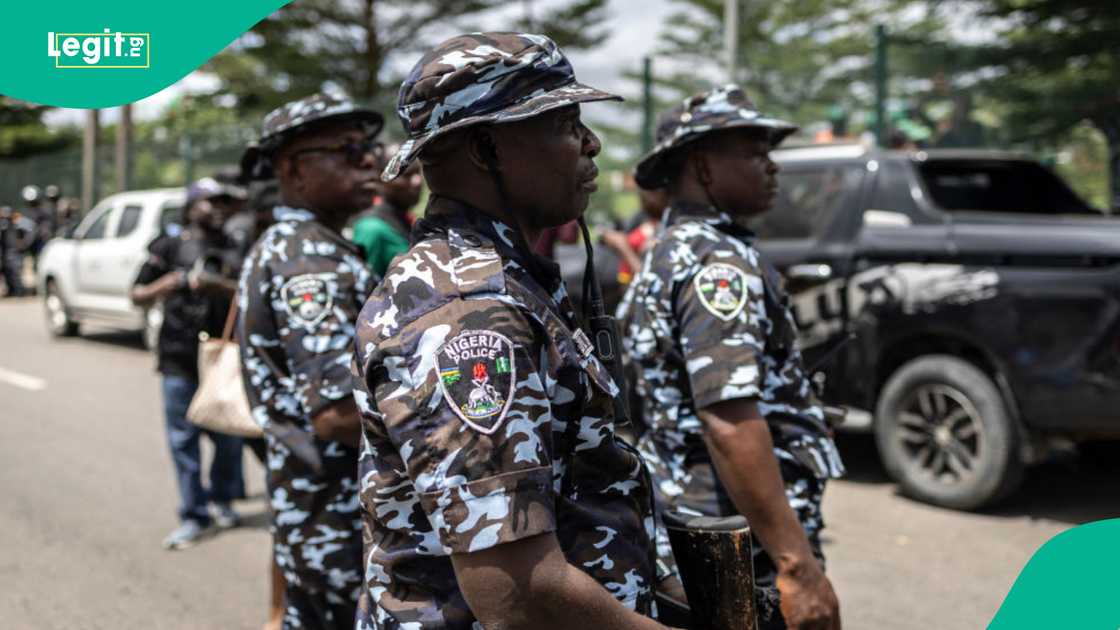A fresh wave of alleged police extortion is stirring public debate in Ogun State following accusations by Olawale Ayomide, a student at Tai Solarin University of Education. Olawale claims he was compelled to part with N99,000 by police officers from the Igbeba Division, after he was stopped on the Sagamu–Ijebu Ode road. His account highlights ongoing concerns about law enforcement practices in Nigeria, sparking renewed calls for accountability and reform.
In a twist that only added more drama to the incident, one of the officers reportedly forgot his official police cap inside the vehicle after their interaction with the students—a detail that has gone viral and further fueled local outrage.
Ogun Police Grapple with Renewed Scrutiny Over Extortion Claims
According to Olawale’s testimony, he had been driving his mother’s car into Ijebu Ode on a recent Tuesday when several armed policemen halted his vehicle and ordered him to accompany them to their station. Speaking to Punch, Olawale explained that the officers challenged him over his use of a car without number plates, even though he tried to clarify that the registration was still pending and documents were available to support his explanation.
“I was heading to Ijebu-Ode from Sagamu when I encountered some policemen along the road. They stopped us and asked my friend and me to step out of the vehicle. The car belongs to my mum, and she’s currently processing its documents,” he recounted.
Despite his attempts to contact his mother and confirm the vehicle’s ownership, his pleas were dismissed. The student alleges that the officers initially threatened to detain him unless he could pay a hefty “release fee” of N1 million—a sum later negotiated down to N100,000. Olawale eventually managed to transfer N99,000 to the police, which he raised by selling his second mobile phone and sending the funds via a local PoS (Point of Sale) operator nearby.
Stories like Olawale’s have become all-too-familiar for many Nigerian road users, raising persistent anxieties about the prevalence of extortion and overreach at police checkpoints across the country. This incident has once again brought to the fore questions surrounding the transparency and accountability of security personnel, especially on highways notorious for police stops.
Students Allegedly Forced to Give Statements Under Pressure
Another student, Dare Ifeanyi, was in the vehicle at the time and corroborated Olawale’s account. According to Dare, officers transported the pair to a nearby police station, where they were allegedly coerced into making false written and video statements—effectively admitting to offenses they insist they did not commit.
They also told us to say the vehicle didn’t belong to our mum but that we bought it for N5m from the proceeds of fraud. We refused at first, but they threatened to detain us, so we did as they said,” he said.

Source: Facebook
After the ordeal, the students were released. When they returned home, Olawale’s mother, Mrs. Omolabake, discovered a police cap left behind on the back seat—a clear indication of the officers’ presence in the car. She promptly confirmed her ownership of the vehicle and expressed concern over the officers’ conduct, vowing to escalate the matter once her husband returned.
“I saw the cap in the vehicle and asked my son where he saw it. Initially, he did not want to tell me what happened until after I persuaded him. This is not good at all,” she said.
Mrs. Omolabake stated her husband would visit the station to demand a refund and to insist the recorded videos be deleted. She said, “It’s not just about the money, but about protecting innocent citizens from such unjust treatment.”
Adekunle Taofeek, the coordinator of the Take It Back Movement in Lagos, quickly took up the cause online and shared a photograph of the recovered police cap on X (formerly Twitter), emphasizing the need for increased police accountability.
“Some policemen extorted my brother along the Ijebu Ode road yesterday. They collected 100k illegally from him and forgot their cap inside his car,” he wrote.
While many in the local community are demanding answers, efforts by journalists to reach Ogun State Police spokesperson Omolola Odutola proved unsuccessful. Repeated calls and messages reportedly went unanswered as of the time of reporting. For further official responses, see the Nigerian Police Force Facebook page.
Recurring Problems with Police Conduct and Public Trust
Reports of extortion and misuse of authority at police checkpoints have persisted over the years in Nigeria and across parts of West Africa. According to Transparency International’s Global Corruption Barometer, police are frequently perceived as some of the most corrupt public officers by ordinary citizens. Such experiences seem to erode public trust in law enforcement and threaten ongoing reforms, especially as African nations, including Nigeria and Ghana, strive for improved governance and the rule of law.
Policy experts argue that these repeated allegations reflect broader systemic issues. Lagos-based legal analyst Ozioma Udeh notes, “Until there are visible consequences for officers found guilty of misconduct, these abuses may persist. Proactive oversight, as well as consistent public reporting and independent investigations, are vital for restoring trust.”
Human rights campaigners also highlight the dangers of unchecked police power, pointing to the 2020 #EndSARS protests in Nigeria, which pushed for an end to police brutality. While some reforms were promised in the aftermath, many activists contend that enforcement and accountability remain weak, meaning incidents like Olawale’s continue to surface.
- Road users, especially young Nigerians and students, consistently report demands for bribes at checkpoints.
- Lack of transparency in police procedures contributes to fear and reluctance to engage with officers.
- Campaigns led by civil society organisations and digital activists are bringing more cases into the public eye.
The Legal Background: Vehicle Registration and Police Powers
By law, all vehicles in Nigeria must be registered and display valid number plates, as stipulated by the Federal Road Safety Corps (FRSC) and relevant state agencies. However, it’s also common for vehicle processing to experience delays, prompting some drivers to carry evidentiary documents showing their application status. Nonetheless, experts explain that stopping a vehicle for incomplete registration should not result in arbitrary detention or extortion, but rather follow due and transparent legal process.
“If a car is in the process of being registered and there is no intent to misuse the law, officers should verify ownership through official means rather than resort to intimidation or financial demands,” said Ogun-based lawyer Abdulrahman Salako.
Ogun’s Case in Regional and Continental Context
While the specific circumstances of this case are local, they echo broader challenges across West African countries where law enforcement agencies face scrutiny over conduct and public accountability. In Ghana, for example, similar concerns have been raised about the need for independent investigations into reports of police misconduct. International watch groups, including Amnesty International, regularly call for better training, higher professional standards, and stronger enforcement of disciplinary measures.
Experts stress that restoring faith in policing is not just a Nigerian problem but a continental task—as the credibility and effectiveness of law enforcement play crucial roles in economic stability and citizens’ everyday safety throughout Africa.
Spotlight on Police Integrity: Not All Officers Are Compromised
It’s important to note that while some officers face allegations of corruption, others strive to uphold their integrity. In a separate incident reported by Legit.ng, Superintendent of Police Ibrahim Sini claimed he once refused a N150 million bribe—an act he said was guided by his commitment to peace of mind and moral principles. The bribe, allegedly offered by Akintoye Akindele, a business executive, was intended to sway police action. This story serves as a reminder that the struggle to maintain ethical standards within the force continues, even as high-profile abuses come to light.
Cases like Sini’s are at the heart of debates about how to effectively reward good conduct and weed out bad practices—and why public vigilance, official oversight, and community engagement must be part of any real reform.
What’s Next for Police Reform and Public Confidence?
Nigerians want a policing system that protects rather than preys on them. With social media amplifying each new report of police overreach, momentum is growing for lasting change, including increased transparency, clear complaint channels, and real consequences for those found liable of misconduct. Affected citizens, meanwhile, are encouraged to gather evidence, report cases through official platforms, and seek legal counsel wherever possible.
As the conversation continues, the question remains: How can Nigeria and other African countries ensure that their police restore faith and genuinely serve communities—while holding erring officers to account?
What’s your take on these police extortion claims and the broader issue of public trust in law enforcement? Have you had similar experiences on Nigerian or West African roads? Drop your comments and stories below—and don’t forget to follow us for the latest updates as we track this evolving debate.










